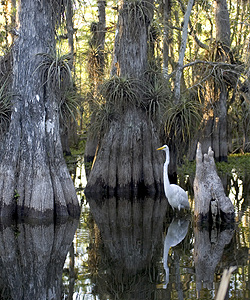If it's natural for Earth's climate to fluctuate and we have had warm periods in the past, then isn't the current warming trend part of a natural process? Shouldn't nature be capable of coping on its own?

NPS/Rodney Cammauf
Earth's temperature fluctuates naturally over tens of thousands to millions of years. Scientists take these fluctuations into account when they assert that we are currently experiencing unique conditions in Earth's history. Scientists have found only one variable to explain the relatively recent rapidity of global warming: an increase in greenhouse gases in the atmosphere due to human activity. By burning fossil fuels, humans have increased carbon dioxide in the atmosphere by 45 percent since 1750.
A little greenhouse effect is natural. It keeps our planet at a temperature that is suitable for human life. When sunlight reaches Earth, some of the heat reflects from light-colored surfaces like snow or ice caps and radiates back into space. The rest of the incoming heat is trapped by greenhouse gases in the atmosphere, including carbon dioxide, and warms our planet. This becomes too much of a good thing when more and more heat is trapped in the atmosphere, raising global temperatures beyond what is suitable for human life.
It's true that life on Earth can generally cope well with gradual change. But the current warm up, and the speed at which it is happening, is unprecedented. In a few decades scientists have noted a sharp rise in atmospheric carbon dioxide in correlation with a global temperature increase—changes that would normally occur over tens of thousands to millions of years. These accelerated changes challenge the ability of living things—plants, animals, and humans—to adapt and ultimately survive rapidly shifting environmental conditions.
Part of a series of articles titled Climate Change in Nth California and Sth Oregon .
Last updated: February 3, 2015
